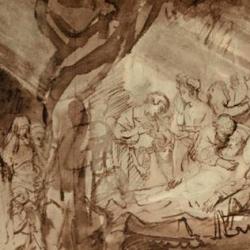As the subtitle suggests, Carlos Bovell’s By Good and Necessary Consequence: A Preliminary Genealogy of Biblicist Foundationalism is a genealogical critique of what he calls biblicist foundationalism, defined as “the decision to restrict confessional theology to the deduction of good and necessary consequences from express biblical statements.” The book is largely an examination of how deduction and “axiomaticism” worked in ancient and medieval philosophy, in order to show that the Reformed notion of deduction “is not at all commensurate with the classical invention and subsequent philosophical appropriations of axiomatic and deductive methodologies, not to mention contemporary estimations of axiomatic procedure.” It is “a historically-conditioned innovation that was naturally elicited from Protestants by the prevailing intellectual milieu of the seventeenth century.”
Reformed Protestants adopted this deductive foundationalism in reaction to widespread skepticism and “to shore up Reformed versions of the Christian faith against the triple threats of Catholicism, religious enthusiasts, and the rational and literary skeptics.” It was a theological appropriation of Cartesian method. The resulting epistemological turn in theology does not represent “an inherently Christian (or even biblical) preoccupation with epistemic justification.”
There’s a good bit to admire and affirm in this dense and carefully argued book. I have some objections, though.
First, though Bovell sets out the social and intellectual context of the development of Reformed foundationalism, he remains largely within the confines of philosophy. It would doubtless make some difference in the argument if he had attended to debates over actual practices and rules – as, for instance, the debates concerning vestments – to see how the deductive system worked in practice.
Second, in such debates, freedom of conscience comes to the fore: Whom are we obligated to obey? Does the church have authority to require certain liturgical forms? Placing Scripture over the church as judge was a way of guarding the limits of church authority.
Third, I agree with Bovell’s suspicions about Cartesian foundationalist systems, but I believe there are ways of affirming sola scriptura and the scope of Scripture without Descartes. John Frame has gone a long way to offering an alternative, but Bovell makes only glancing references to Frame. (He notes that Frame’s first book is about the knowledge of God, evidence of the primacy of epistemology.)
Finally, Bovell offers a Husserlian alternative to biblicist foundationalism, one that attempts to overcome the “forgetfulness of origins” of which Husserl (in Derrida’s account) wrote. Bovell illustrates how this works by reviewing Irenaeus’s arguments in favor of a fourfold gospel. Conservative Christians, he says, accept the four canonical gospels, but they reject the Irenaean argument that supports it. Even when they explore the foundations of canonicity, they already know beforehand that there are four gospels and that they are inerrant. Bovell suggests that “foundationalist-bibliological verdicts be suspended” so that Christians have “be given a real chance to return to origins, yet not in a biblicist-foundationalist way but in a searching and Spirit-led epoche.” If this method were followed, “Christians might learn for themselves, as it were for the first time , how comparatively bereft of spiritual teaching and nourishment the uncanonical materials putatively are.” They can then pass on the tradition “without losing the originary sources of meaning.” Believers could “re-experience the originary process.”
As I suspect Bovell would admit, this is a “historically-conditioned” proposal, a proposal that attempts to address a widespread crisis of biblical authority. As such, it has merit. Times of crisis force us to start some things over. But his proposal, which seems to imply that each generation of believers must repeat the re-experience of the first generations, is a form of primitivism that leaves little room for theological development.
Though I don’t accept all his conclusions, Bovell’s book gets at some important and (pardon the pun) fundamental issues in Protestant theology. Bovell describes his book as a “preliminary genealogy.” I hope he’s preparing a more elaborate one.











